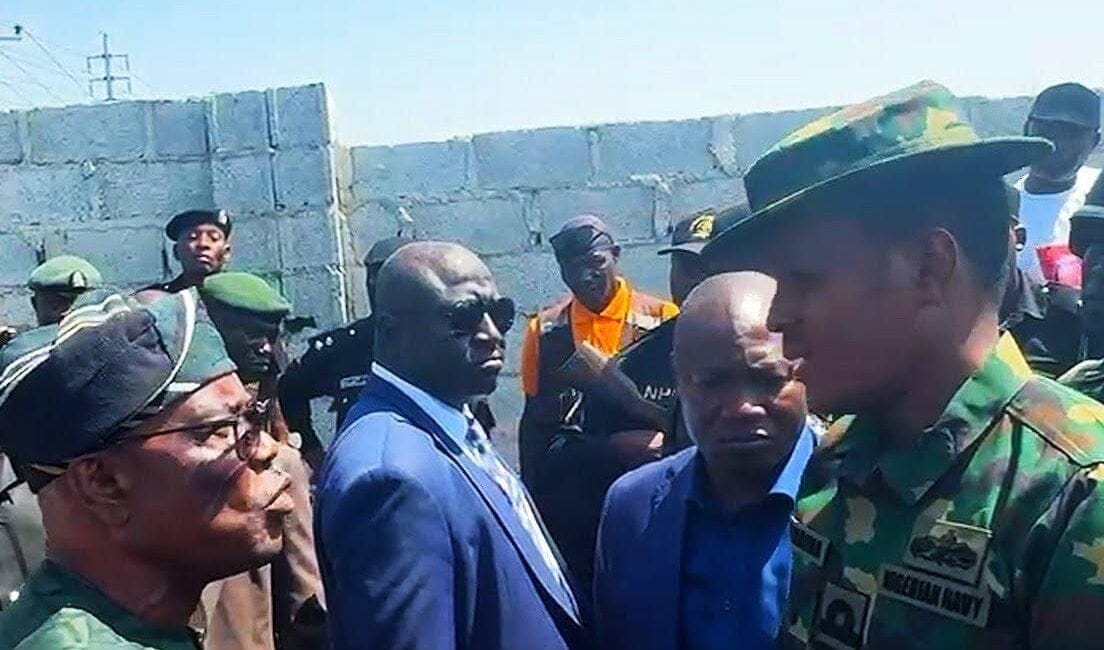A fiery public confrontation between Nigeria’s Federal Capital Territory (FCT) Minister, Nyesom Wike, and a senior naval officer has erupted into a national sensation, laying bare simmering tensions over land, authority, and the reach of civil power in the heart of the nation’s capital.
The incident, which was captured on video and quickly went viral across social media platforms, showcases a heated altercation over access to a disputed parcel of land in the upscale Asokoro district of Abuja. The footage shows the typically assertive Minister Wike, surrounded by aides and security personnel, in a tense standoff with the naval officer, who was reportedly present to enforce a claim on the land on behalf of the Nigerian Navy.
A Clash of Titans on the Asokoro Battlefield
While the precise legal ownership of the land remains under contention, the public clash has become a symbol of a much deeper conflict. On one side is Wike, a high-profile “super minister” appointed by President Bola Tinubu and known for his bulldozer approach to governance, tasked with restoring order and reclaiming the Abuja master plan. On the other is the Nigerian Navy, a respected national security institution, which claims a legitimate right to the property.
Eyewitness accounts and the viral video suggest the argument grew from the minister’s team attempting to access or demarcate the site, an action resisted by the naval personnel on guard. The exchange, though partially obscured, was described as “stormy” and “unprecedented,” highlighting a rare moment where the authority of a powerful civilian minister was directly challenged by the uniformed arm of the state.
Beyond the Altercation: A Symptom of Systemic Friction
Analysts observing the event suggest this is more than a simple dispute over a plot of land. It is a microcosm of the long-standing, often hidden, tensions between civil authorities and the nation’s powerful security agencies over land enforcement and administrative control within the Federal Capital Territory.
Abuja, since its inception, has been plagued by controversies surrounding land allocation, with multiple certificates of occupancy sometimes issued for the same plot, leading to conflicts between government bodies, private developers, and security agencies who often secure vast swathes of land for barracks and other facilities.
“This confrontation was inevitable,” remarked Dr. Chidi Nwafor, a political analyst based in Lagos. “Minister Wike has made it his mission to dismantle illegal structures and reclaim land, a process that was always going to collide with the entrenched interests of powerful state actors, including the military. This public showdown asks a critical question: who truly has the final say in the FCT—the civilian administrator or the gun?”
The Aftermath and the Unanswered Questions
The incident has sparked a wildfire of debate online and in editorial pages. Some Nigerians have praised Wike for his fearlessness in confronting what they see as an overreach by the military, arguing that no institution should be above the law of the civil administration. Others have criticized his approach as brash and disrespectful to the armed forces, warning that such public spats could undermine the morale and cohesion of the nation’s security apparatus.
As the video continues to circulate, the pressure is mounting on the Presidency to issue a statement and potentially mediate the dispute. The Nigerian Navy and the FCTA are yet to release official, detailed reports on the incident, leaving a vacuum filled by speculation and partisan commentary.
The core issues, however, remain unresolved. The clash between Minister Wike and the naval officer is a stark reminder of the complex power dynamics at play in the governance of African capitals. It underscores the challenges of enforcing urban planning laws in the face of institutional might and raises fundamental questions about the balance of power in a modern democracy.
🇳🇬 Wike vs. The Navy: Abuja Land Clash Exposes Fissures Between Power and Uniform

Leave a Reply